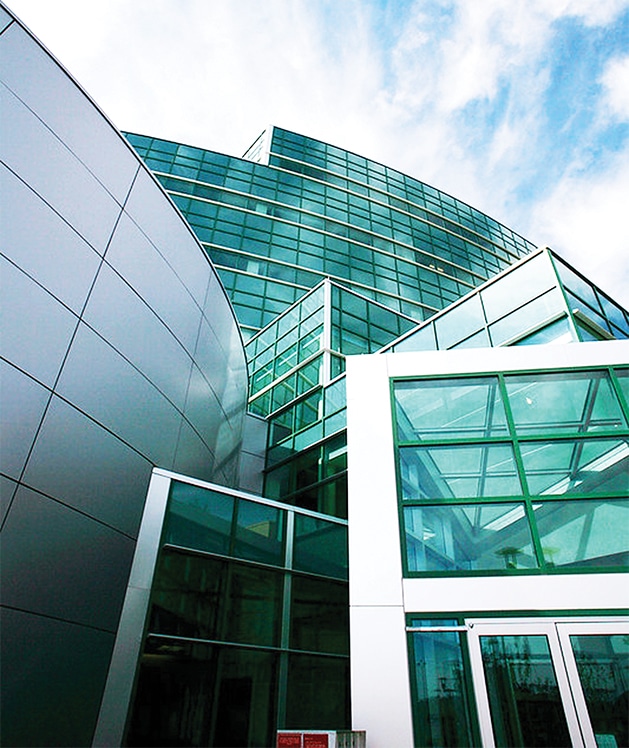
National Security Sciences Building at Los Alamos National Laboratory. Courtesy/LANL
 Kelly Beierschmitt
Kelly Beierschmitt
By BONNIE J. GORDON
Los Alamos Daily Post
bjgordon@ladailypost.com
It is common knowledge that Los Alamos National Laboratory is using science to fight COVID-19.
Its struggles to maintain a safe working environment for its staff and its efforts to help fellow New Mexicans cope with the impacts of the virus are less well known.
Safe Operations at LANL
LANL Deputy Director of Operations Kelly Beierschmitt spoke to the Los Alamos business community about LANL’s actions to protect its workforce during a July 13 meeting via Zoom.
“We teach them to work like millennials!” Beierschmitt said of LANL’s new teleworkers. “The flexibility is actually causing increased productivity for some people. If I can give workers that flexibility, we’re going to do it.”
A teleworking pilot is currently underway at LANL.
Out of 12,752 workers, 4,900 employees come to the physical location in Los Alamos, either full or part time, Beierschmitt said.
“Until we have effective treatment or a vaccine, we will continue in this mode,” he said.
No more than 6,000 workers will be on-site by August and there are no plans to go beyond that at this time, Beierschmitt said, only those with a need come to the lab in person.
Workers, including those involved in construction, practice social distancing and CDC guidelines are in place for everyone on-site, he said.
Beierschmitt assured business people attending the Zoom meeting that no one is discouraged from patronizing local businesses during lunch breaks or before and after work.
LANL has gotten creative with obtaining needed hygiene supplies. The Lab enlisted Santa Fe Brewing and Taos Brewery to produce hand sanitizer and Lab chemists produced cleaning supplies.
The Lab is testing approximately 400 people per week and gets results within a day or two, Beierschmitt said. The Lab conducts random testing of healthy individuals and tests anyone with symptoms or anyone who thinks they may be at risk.
“We do our own version of contact tracing,” Beierschmitt said. “We are tracking hot spots such as McKinley County closely … it seems to be working.”
What if an employee who has been on the premises tests positive?
“We have a team for advanced cleaning if someone tests positive or is a presumptive positive,” Beierschmitt said.
Of those tested, there were 11 positives last week. As of July 13, that number had jumped to 24.
The Lab has been able to keep its mission and its critical work going forward in spite of COVID-19, Beierschmitt said. The LANSCE (Los Alamos Neutron Science Center) and DARHT (dual-axis radiographic/radiography hydrotest facility) are operational and delivering needed medical isotopes.
With help from the Coronavirus Aid, Relief, and Economic Security (CARES) Act, LANL has been successful in keeping its workers employed, even when they cannot perform all their duties, Beierschmitt said.
Community Service
LANL’s battle against the virus continues outside its gates and into the surrounding communities.
“The Laboratory has taken a number of initiatives to combat the impact of COVID-19 in the region,” said Tricia Ware of the LANL Public Affairs Office. “The majority are via the Community Partnerships Office, which contributes to the quality of daily life in the seven-county region surrounding the Lab in the areas of economic development, educational excellence, and active employee engagement through volunteerism and philanthropy. The seven counties are: Los Alamos, Mora, Rio Arriba, Sandoval, San Miguel, Santa Fe and Taos.
Here are a few examples:
Employee Food Drive for The Food Depot – The Food Depot, located in Santa Fe and serving all of northern New Mexico, had faced record demand, and Laboratory employees responded with their most generous annual employee drive ever: Final total was $53,580 in employee donations, while Triad National Security chipped in an additional $10,000, totaling $63,580 on April 10, the final day of the drive. As The Food Depot estimates $1 buys four meals, this amounts to 254,320 meals for New Mexicans in need.
Contribution to the Pueblo Relief Fund – Triad National Security, the management and operations contractor of Los Alamos National Laboratory, has given $10,000 to assist New Mexico’s Native American Pueblos, which have been adversely affected by the COVID-19 public health crisis. The funds will go to the Pueblo Relief Fund and be used to help slow the spread of the COVID-19 virus and support tribal members.
Help for Community Foundations – Triad National Security, the management and operations contractor of Los Alamos National Laboratory, has pledged $40,000 to three local philanthropies to address emergency needs caused by the COVID-19 public health crisis. Funds are prioritized in the areas of healthcare, food security, childcare for essential workers, and education.
Los Alamos Community Foundation, COVID-19 Nonprofit Emergency Response, $10,000. Established in 2015, the focus of the Los Alamos Community Foundation is inspiring, facilitating, and supporting enduring philanthropy. Funds will support nonprofits in Los Alamos and Rio Arriba counties.
Santa Fe Community Foundation COVID-19 Response Fund, $22,000. The Santa Fe Community Foundation is devoted to building healthy, vital communities where racial, cultural, and economic differences do not limit access to health, education, or employment. Funds will serve nonprofits in Mora, Rio Arriba, San Miguel and Santa Fe counties.
Taos Community Foundation COVID-19 Response Fund, $8,000. Over the last 20 years, Taos Community Foundation has awarded more than $9.3 million in grants and scholarships that enrich the lives of its citizens. Funds will serve nonprofits in Taos County.
Supporting Online Learning – Area teachers, parents, and students are striving to make the most of the new online learning environment. The Laboratory and area partners have recently collaborated to unveil the new online STEAM (Science, Technology, Engineering, Art, Math) Learning Hub at nmsteamhub.com. It offers a range of selected resources to help parents, students and teachers in STEAM learning at home, providing categorized links and activities from local partners such and from national organizations such as PBS and NASA.
Science and Technology
Scientists and engineers have been in the forefront of the battle to understand and combat COVID-19. From innovative tracking models to ingenious inventions to aid medical professionals, LANL is on the job, using its expertise. Those interested in reading about these efforts should visit the newsroom’s science page at lanl.gov.
One recent breakthrough was published July 2 in the journal Cell. The article shows that a specific change in the SARS-CoV-2 coronavirus virus genome, previously associated with increased viral transmission and the spread of COVID-19, is more infectious in cell culture. The variant in question, D614G, makes a small but effective change in the virus’s ‘Spike’ protein, which the virus uses to enter human cells.
“The D614G variant first came to our attention in early April, as we had observed a strikingly repetitive pattern,” said Bette Korber, a theoretical biologist at LANL and lead author of the study, in a LANL news release, “All over the world, even when local epidemics had many cases of the original form circulating, soon after the D614G variant was introduced into a region it became the prevalent form.”
Geographic information from samples from the GISAID COVID-19 viral sequence database enabled tracking of this highly recurrent pattern, a shift in the viral population from the original form to the D614G variant. This occurred at every geographic level: country, sub-country, county and city.

